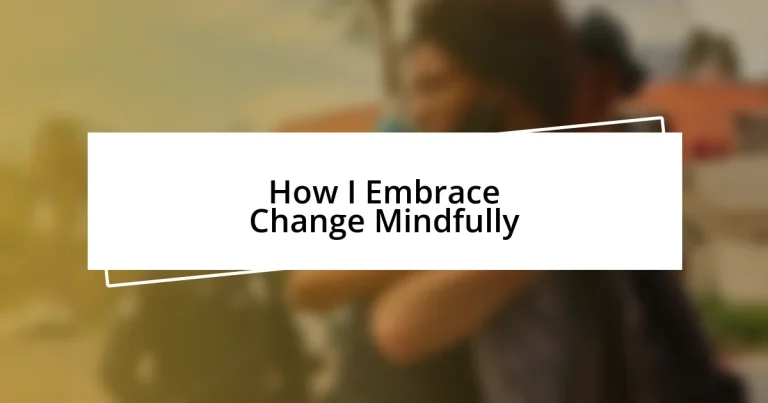Key takeaways:
- Change, both external and internal, is an integral part of life that can lead to personal growth and deeper connections.
- Practicing mindfulness enhances emotional awareness, reduces stress, and cultivates resilience, helping to navigate life’s transitions effectively.
- Reflecting on personal growth through journaling and recognizing resistance can empower individuals to embrace change and learn valuable lessons from discomfort.
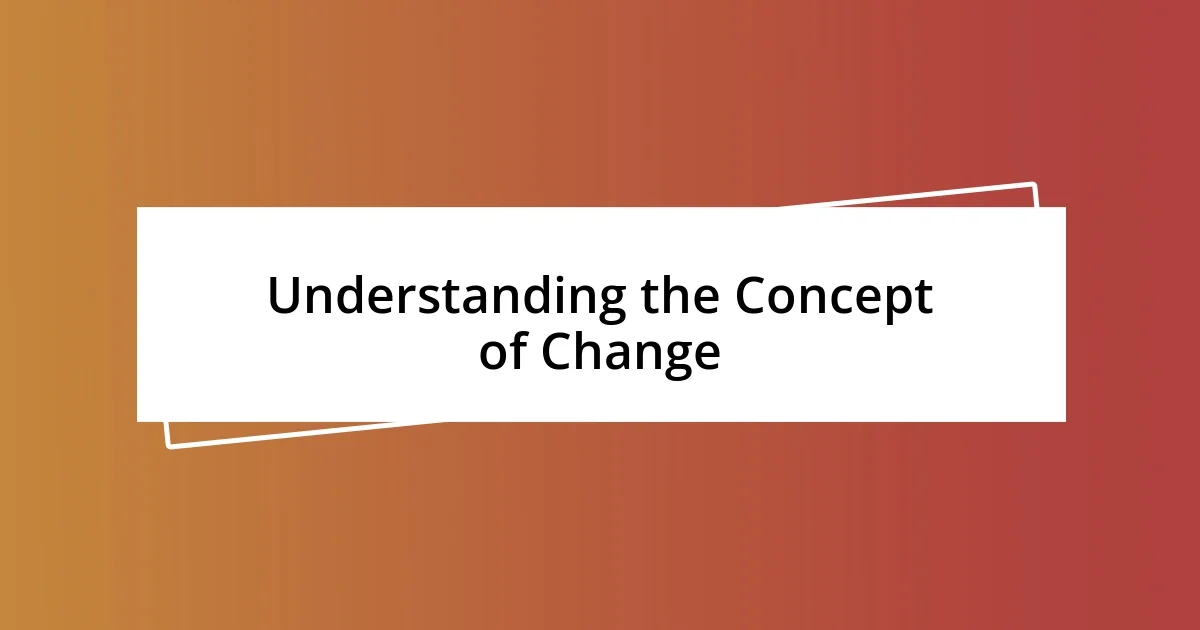
Understanding the Concept of Change
Change is an inevitable part of life, yet it often feels daunting. I remember when I switched careers; the mere thought of starting from scratch filled me with anxiety. It made me wonder, why do we resist change despite knowing it can lead to growth?
I have learned that change can be both external and internal. External changes—like a new job or moving to a different city—are often visible, yet internal shifts, such as changing our mindset or beliefs, can be just as transformative. I once faced a huge internal change when I decided to prioritize self-care. It was surprising how that simple shift affected every aspect of my life.
Sometimes I catch myself reflecting on the transient nature of everything around us. Isn’t it fascinating how a single experience can reshape our understanding? For instance, witnessing a friend go through a breakup made me appreciate the importance of resilience. That experience reminded me that change can hurt, but it can also pave the way for new beginnings and deeper connections. Isn’t that, ultimately, what makes life so rich?
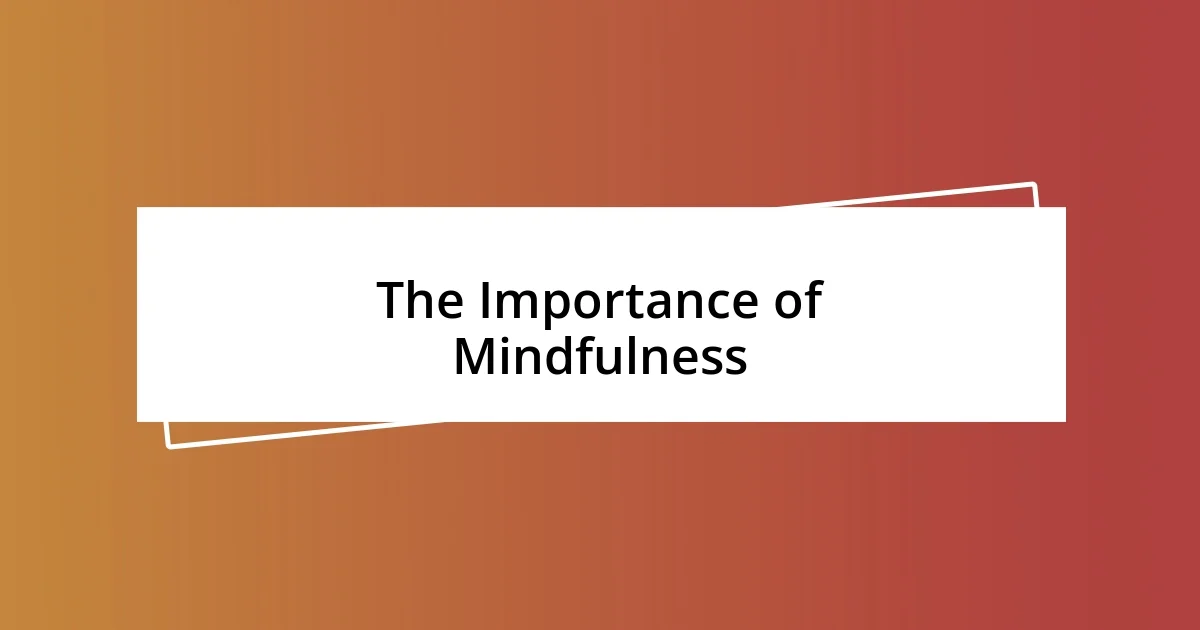
The Importance of Mindfulness
Mindfulness plays a crucial role in navigating change. When I first started practicing mindfulness, I was surprised by how it grounded me during turbulent times. Focusing on the present moment helped me manage my anxiety and embrace uncertainty. It became clear that being mindful allows us to observe our thoughts without judgment, creating space for acceptance and growth.
- Enhanced Awareness: Mindfulness encourages a heightened awareness of our emotions and reactions, helping us respond rather than react.
- Stress Reduction: By grounding ourselves in the present, we can significantly lower stress levels associated with change.
- Increased Resilience: With practice, mindfulness builds resilience, enabling us to bounce back quicker from setbacks.
- Improved Decision Making: A clear mind leads to better decision-making, particularly during challenging transitions.
- Cultivating Compassion: Mindfulness fosters self-compassion, reminding us to treat ourselves gently as we navigate the ups and downs of life.
Engaging in mindfulness has allowed me to appreciate the small victories during times of transition, whether it’s adjusting to a new routine or accepting an unexpected twist in plans. Over time, I’ve come to realize that mindfulness isn’t just a practice; it’s a mindset that nurtures patience and appreciation in the face of change.
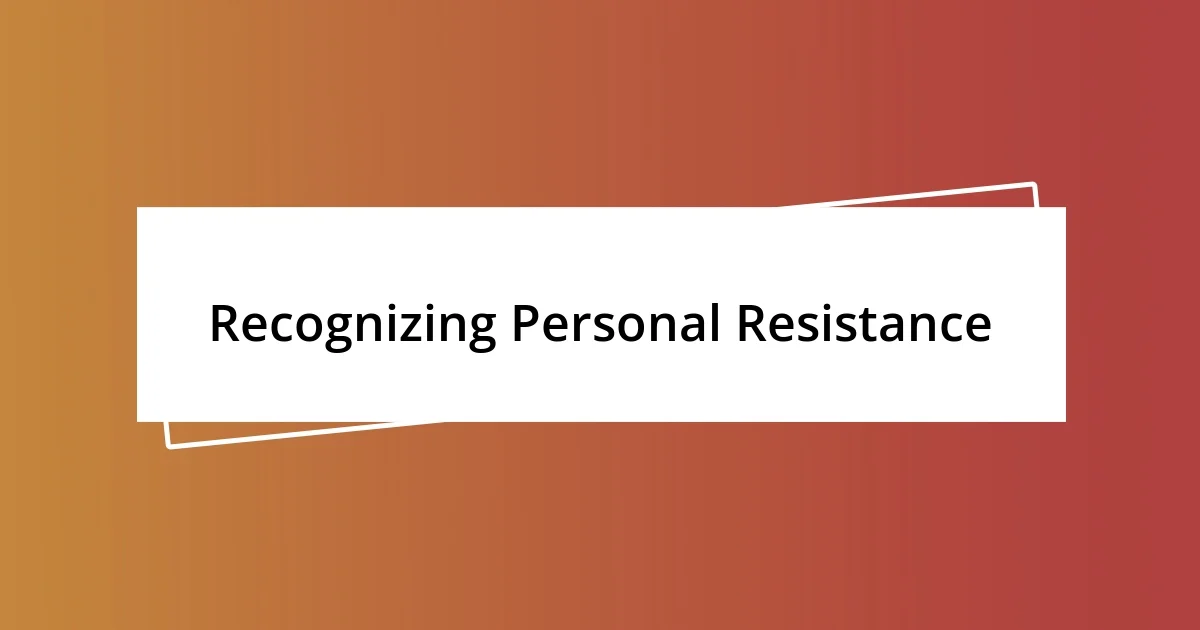
Recognizing Personal Resistance
Recognizing personal resistance can be quite an eye-opener. I recall a time when I was considering a major life change—starting my own business. Initially, I felt a strong pull to stick with my comfortable job. This resistance stemmed from fear of failure and the unknown. It taught me that acknowledging this resistance is the first step toward embracing change.
It’s interesting how personal resistance often reveals itself in subtle ways. Sometimes I find myself making excuses to delay decisions, or I might catch myself obsessively over-analyzing every potential outcome. This behavior can create a mental loop that keeps me stuck in fear. Understanding these patterns has helped me realize that it’s okay to feel apprehensive—what matters is how I choose to move forward despite those feelings.
Self-reflection has become a powerful tool in recognizing my resistance. I’ve learned that journaling my thoughts can bring clarity. For example, during a recent pivotal moment in my life, writing down my fears showed me how irrational they were, allowing for a healthier perspective. This practice not only helps me uncover what holds me back, but it also allows me to embrace change more mindfully.
| Signs of Personal Resistance | Possible Emotional Responses |
|---|---|
| Avoidance of decisions | Fear and anxiety |
| Procrastination on tasks | Overwhelm |
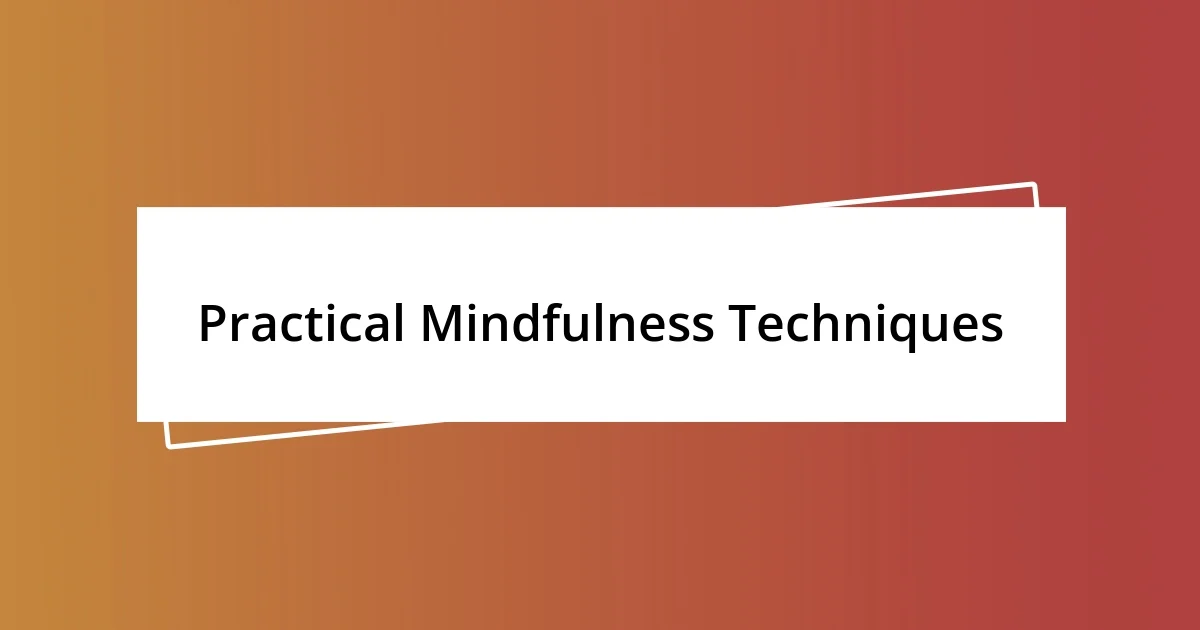
Practical Mindfulness Techniques
Mindfulness techniques can be incredibly practical and accessible, offering you the means to navigate change with ease. One technique I cherish is the body scan meditation, where I take a few moments to mentally check-in with each part of my body. When I first tried this, I marveled at how quickly I could notice tension I hadn’t previously acknowledged. Have you ever felt your shoulders creep up towards your ears when stress hits? The body scan invites me to release that tension, bringing my focus back to the present.
Another technique that has supported me is mindful breathing. I start by taking a deep breath in, hold it for a moment, and then slowly exhale. This simple act of focusing on each breath pulls my attention away from swirling thoughts about the past or future. I often find peace in this rhythm, especially during stressful times. Have you noticed how just a few deep breaths can change your whole outlook?
Finally, I’ve incorporated gratitude journaling into my routine. Each evening, I jot down three things that went well or brought me joy that day. Initially, I was skeptical about its impact, but I soon recognized that it shifted my perspective. Instead of fixating on what went wrong, I began to celebrate small moments of success. What about you? Could you give gratitude journaling a try? You might be surprised at how this practice fosters a positive mindset amid life’s transitions.
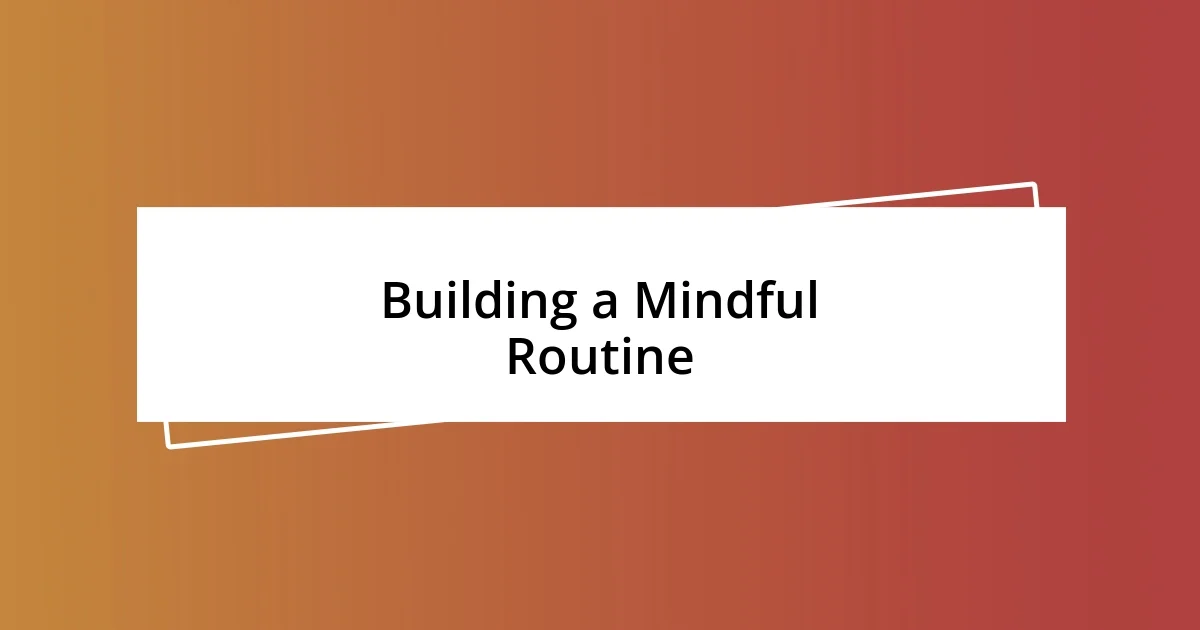
Building a Mindful Routine
Building a mindful routine has been a transformative experience for me. I remember when I first started setting aside time each morning for mindfulness practice; it felt a bit unnatural at first. However, over time, this routine evolved into a cherished part of my day, a moment where I could anchor myself before the chaos unfolded. Have you ever considered how just a few minutes of quiet can reshape your perspective for the entire day?
I’ve also learned that consistency is key in building a mindful routine. For instance, I chose a specific time to engage in mindfulness—right after my morning coffee. This small ritual has become a reliable cue for my mind and body to transition into a space of calm. Do you have a trigger that could help you establish your own mindful moments? Recognizing these cues can shift your mindset and make mindfulness feel less like a task and more like a natural way of being.
Over time, I’ve incorporated small alternating activities to keep my routine fresh and engaging. Sometimes I might meditate, while other days, I focus on mindful walking or even cooking with intention. Each of these activities invites me to be present and fully experience the moment. Reflecting on your own routine, what activities bring you joy and presence? Engaging with different practices can breathe new life into your mindfulness journey.
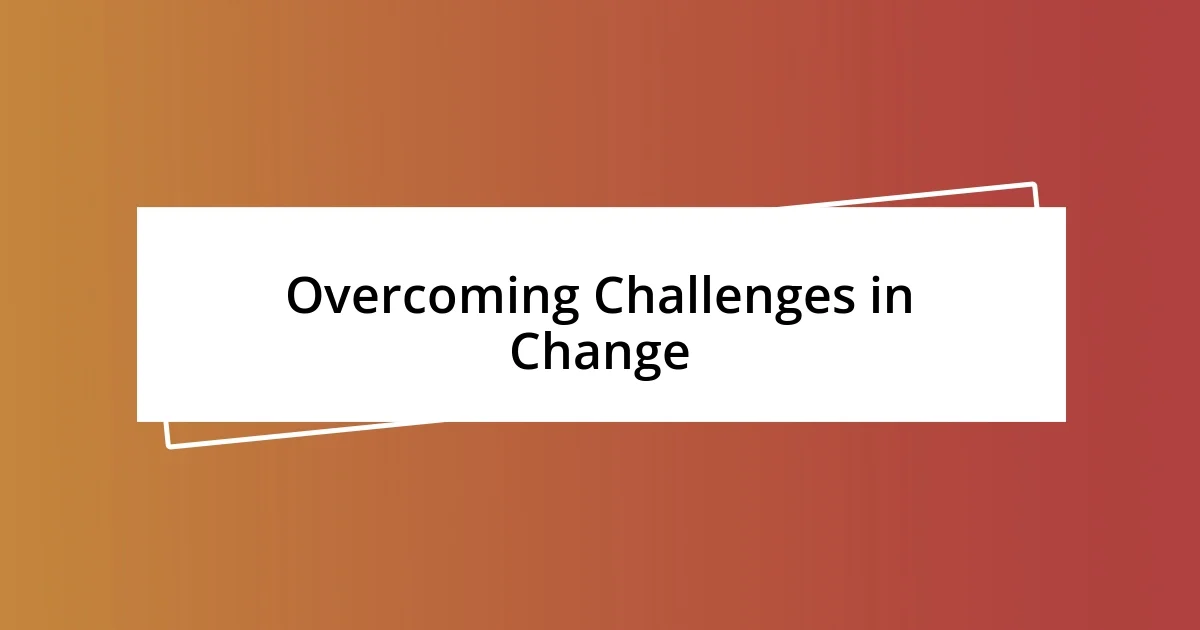
Overcoming Challenges in Change
Change, while often necessary, can bring about significant challenges that require a mindful approach. I remember a time when I faced a major career shift. It felt daunting, and I was overwhelmed by uncertainty. However, I leaned into mindfulness, reminding myself that acknowledging my feelings was the first step toward overcoming them. Have you ever found yourself in a similar position, feeling like you were standing at the edge of a cliff, unsure of what lay below?
One technique that proved invaluable was reframing my thoughts. Instead of viewing the change as a loss, I started seeing it as an opportunity for growth. I vividly recall the moment I shifted my mindset—everything felt lighter, as if a fog had cleared. By focusing on what I could learn rather than what I might lose, I opened up to new possibilities. Have you ever tried looking at challenges through a different lens? You might be surprised by the insights that emerge when you do.
Embracing the discomfort that comes with change is also crucial. There were days when I felt paralyzed by fear, and I allowed myself to sit with that discomfort rather than push it away. I found journaling to be a powerful outlet during those times. As I poured my thoughts onto the page, I could dissect my fears and vulnerabilities, transforming them into actionable steps. How do you handle your discomfort during tough transitions? By acknowledging and working through these feelings, I discovered a resilience within myself that has helped me navigate countless changes since then.
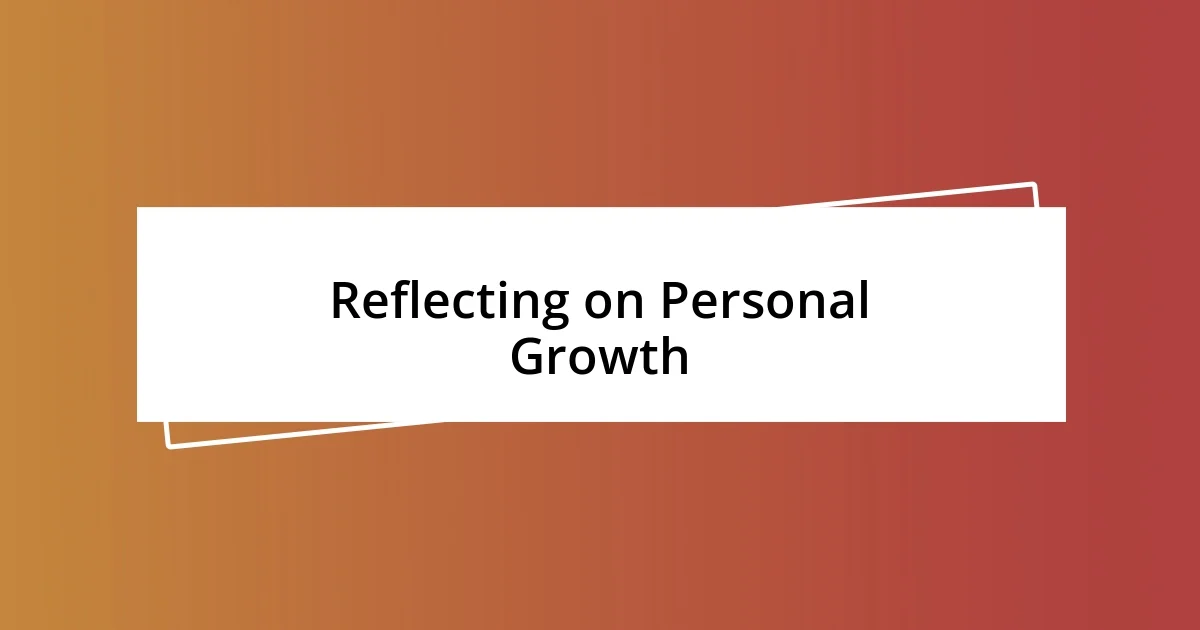
Reflecting on Personal Growth
Reflecting on personal growth can be a profound journey. I distinctly remember a moment when I looked back at the past year and was struck by how far I’d come. It wasn’t just about the milestones—I found that the small shifts in my mindset had made the most significant impact. Have you taken the time to reflect on your own growth lately? Those little victories can often be overlooked but deserve celebration.
I often find myself revisiting journal entries from previous months. Reading them feels like peering into another version of myself, and I get to witness my evolution unfold on the page. There are moments when I read about my worries, and I can’t help but chuckle at how trivial they now seem. This reflection not only highlights my resilience but also reminds me that growth isn’t linear. How do you remind yourself of your journey? Perhaps maintaining a journal can serve as a helpful tool for you as well.
Moreover, I’ve learned to appreciate the lessons that growth often comes wrapped in discomfort. There was a time when I faced a personal setback that left me reeling. Initially, it felt like a roadblock, but looking back, I can see how it nudged me toward new paths I hadn’t considered before. This realization fills me with gratitude; the discomfort taught me valuable lessons about patience and adaptability. When you reflect on your life, can you identify moments that initially felt challenging but led to unexpected growth? Embracing those narratives can be incredibly empowering.











